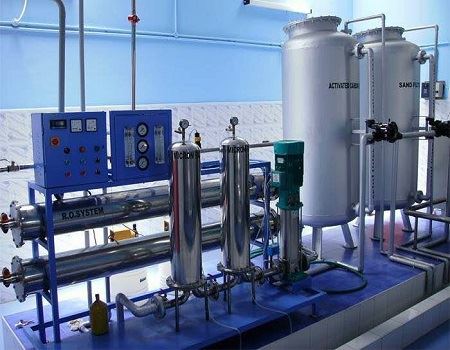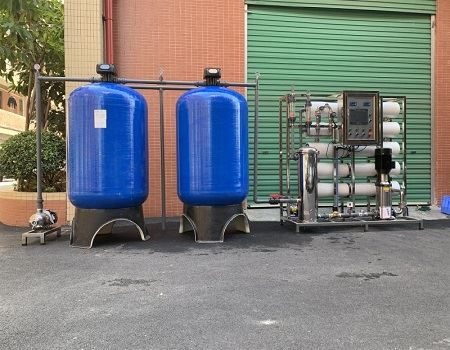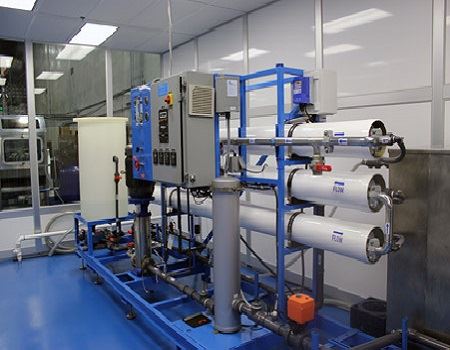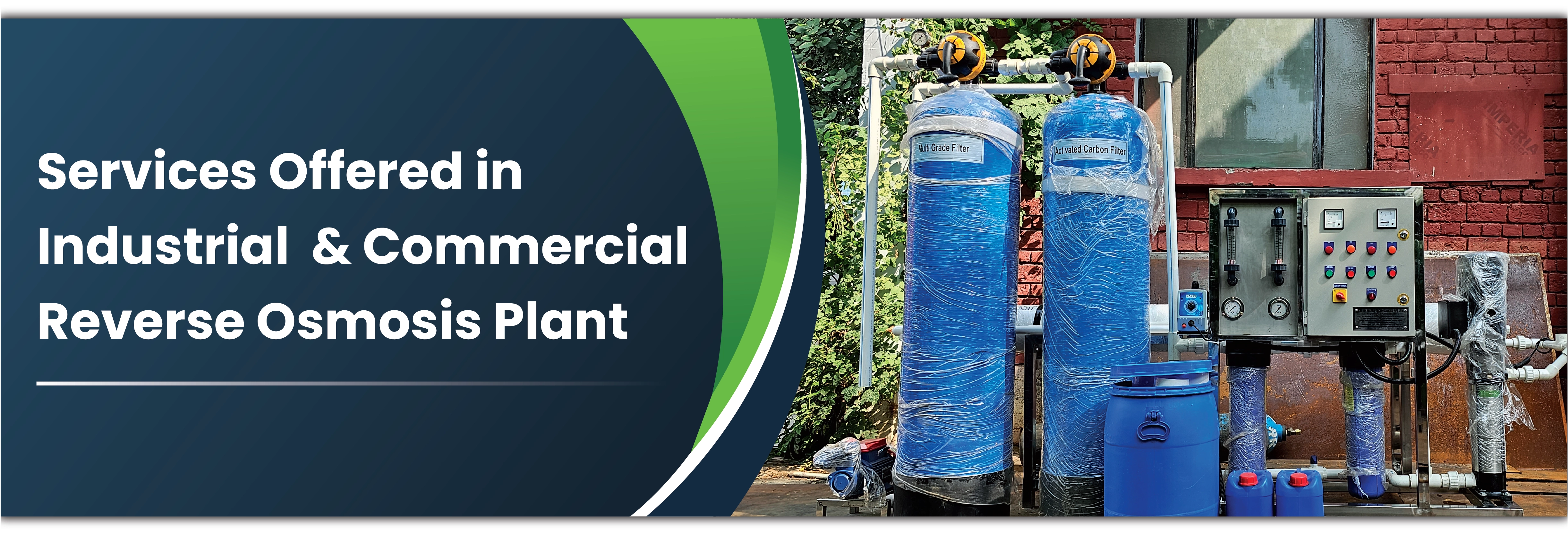Industrial & Commercial Reverse Osmosis (RO) Plant
RO Plant is a manufacturing plant where the process of reverse osmosis takes place. Reverse Osmosis is currently the most mature membrane technology for desalination at a relatively low cost which is employed for approximately 50% of desalination plants in the world.
Reverse osmosis is a pressure-driven membrane separation technology with an operating pressure of 1.5–12 MPa and a cut-off limit of 0.1–1 nm, this can eliminate all suspended solids, dissolved matters, and colloid from the liquid mixture.
Reverse osmosis is the most sophisticated membrane liquid separation technology, which can block all the suspended solids, dissolved matters, colloids, all dissolved salts, and organic matters having a molecular weight greater than 100. However, leachate molecules can pass through. Taking the discharge standard into account, two stage reverse osmosis membrane treatment process is adopted in this project. The first stage reverse osmosis unit aims to treat NF effluent for leachate reuse. The second stage reverse osmosis unit treats the concentrate from the first stage to the level required for incineration. Concentrate of the second stage flows back to incinerator.



Specification of Industrial RO Plant
-
Technology : Reverse Osmosis
-
Membrane Housing : Depends upon no. of membranes
-
No. of Membrane : As per exact capacity
-
Pre-filtration : Activated carbon filter, multigrade filter, cartridge filter, ultra filtration, ozonatore
-
Post-filtration (Optional) : UV sterilizer
-
Other Accessories : Raw water pump, high pressure pump, dosing pump, rota meter, pressure gauze, control panel, skid, volt meter, amp. meter etc
-
Functioning : Automatic
-
Input TDS : 10000 ppm & Above
-
Portable : Easy to transport/can be containerized
Types of RO or Reverse Osmosis Plant
Kelvin Water Technologies Pvt. Ltd. offers a wide range of RO Plants or Reverse Osmosis plants or solution to cater the water-related needs in India. The RO plants or solutions has been diversified into 3 categories as per the usage and requirements of the market:
-
Residential RO plants or systems,
-
Industrial RO plants or systems
-
Commercial RO plants or systems
Full Stainless Steel (SS) RO Plant
Full SS RO plant is built with high quality of stainless steel to make the plant durable, long lasting, efficient working. Due to the nature, complexities and health concerns involved in areas such as food & beverage industry, pharmaceutical industry, textile industries etc, they are in high demand of SS RO plants. Besides such specific industrial undertakings, SS RO plants are highly preferred in filtering sea water and other water sources with high TDS contents.
Some of the features of SS RO Plants
-
Less space required to install
-
Easy to operate
-
Durable and strong
-
Modular design with the modular techniques
-
Less power consumption
Features
-
Stainless steel pumps
-
Microprocessor based control panel
-
FRP Pressure vessel
-
Gauges
-
High rejection TFC Membranes
-
Product and reject flow meters
-
High-pressure tubing and switches
Applications of RO Plant
-
Drinking water for individuals
-
Boiler feed water
-
Ion exchange pre-treatment
-
Beverage production
-
Food processing
-
Pharmaceuticals
-
Microelectronic
-
Aquaculture
-
Hospitals
-
Hotels
-
Car washing
-
Hydrogen production
-
Reef aquariums
Industrial and Commercial RO Plant
FAQ - RO Plant
Q1. What Is an Industrial RO Plant?
Ans. An Industrial RO (Reverse Osmosis) system is a manufacturing plant that uses reverse osmosis to purify contaminated water. Pre-treatment methods for the Industrial RO Water plant include softening, dichlorination, and antiscalant treatment.
Q2. How does an industrial RO plant work?
Ans. The principle of reverse osmosis (RO) works by reversing the natural tendency of water with dissolved salts to flow through a membrane from lower to higher salt concentration. This process can be found all over nature. It is used by plants to absorb water and nutrients from the soil.
Q3. What are components of RO?
Ans. Components for Residential RO Systems. Water Quality Monitors with In-Line TDS. Faucets for RO systems in the home. Storage Tanks for Reverse Osmosis at Home. Membrane Housings for Residential RO Systems.
Q4. What are the advantages of industrial and commercial RO plants?
Ans. The use of Industrial and Commercial RO plants reduces costs. Because RO systems are environmentally friendly, no acids or chemicals are used. As a result, there is no need to invest in acids and chemicals. RO systems employ cost-effective membrane technology. The only cost associated with the RO system is electricity. Because modern water filtration systems use little energy, their operating costs are low.
Q6. What is the use of commercial RO plant wastewater?
Ans. RO plants remove excess chemicals that can harm both humans and machines. The Commercial Reverse Osmosis System is beneficial in both industrial and commercial settings. It ranges from 50 to 10000 litres per hour. It is used for the following purposes, depending on the technique:
Q7. What is Commercial RO Plant?
Ans. Commercial RO Plant is a water purification process that aids in the separation of dissolved contaminants and harmful chemicals, resulting in only clean water. This plant contributes to the production of safe drinking water on a large scale and reduces the risk of water-borne diseases. Commercial RO Plant uses membranes for water treatment, which force water through to make it more pure and safe for drinking or other purposes.
Q8. What are the types of RO (Reverse Osmosis Plant)?
Ans. The RO plants or solutions has been diversified into 3 categories as per the usage and requirements of the market:
- Residential RO plants or systems
- Industrial RO plants or systems
- Commercial RO plants or systems









